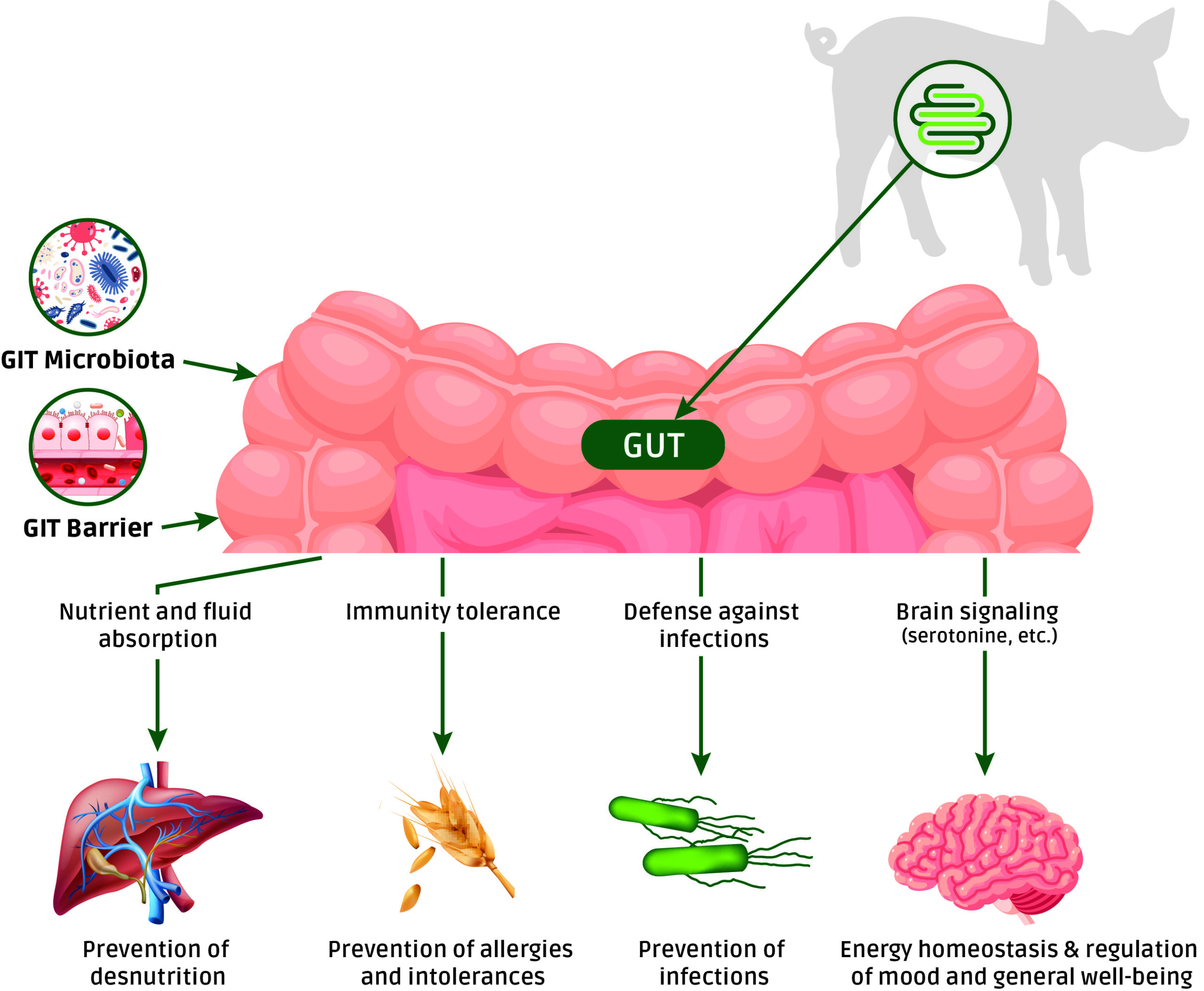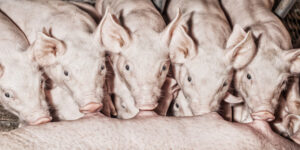Intestinal health in piglets
The largest organ in the body that is exposed to the outside environment while performing a number of complex functions is the gut. The gut is one of the most important aspects of immunity, as 70-80% of the body’s immune cells are found in the gut.
The gastro-intestinal tract‘s most well-known functions are digestion of feed and absorption of nutrients. In addition to aiding in digestion, the intestinal mucosa serves as a barrier to stop germs and toxins from passing through.
Maternal imprinting, gut barrier and gut microbiome: Key factors for health and performance
Maternal imprinting, gut microbiome and gut barrier are interrelated aspects of gut health that play a critical role in early life development and overall health. The animal’s health, well-being, and performance can all be enhanced by modifying the gut microbiome and its metabolites through for example dietary adjustments of feed and feed supplements. Because finally a healthy intestine is crucial for the development of a healthy piglet.
Maternal imprinting
Maternal imprinting, which refers to the transfer of microbes from the sow to the neonate during birth, suckle, and early life, helps to establish the neonate’s gut microbiome and shape the development of the gut barrier. The piglet‘s immune system development and, in turn, their growth and survival are influenced by the sow‘s microbiota. The piglets‘ survival at birth and in their early days depends heavily on the maternal body‘s passively acquired immunity.
Colostrum is initially used to transmit immunity. The piglets‘ colostrum consumption at birth has a significant impact on both their survival and their performance, even after weaning. Here, it is especially crucial to consider the quality and amount of colostrum, which is full of antibodies. Everything that can assist boost the colostrum immunoglobulin concentration during this brief window of time is more than welcome to support piglet immunity.
Gut barrier
The gut barrier, also known as the intestinal mucosal barrier, acts as a physical and functional barrier between the gut lumen and the body’s internal tissues. It helps to prevent the passage of germs and toxins into the bloodstream.
The young born piglet only has a passive immunity, via the sow‘s colostrum. Until the piglet has fully developed its own immune status, there is an immunological gap, which often occurs during the critical phase of weaning.
In order to provide the piglet with the best possible conditions for a successful start, it is important to influence intestinal development in a positive way as early as possible. A stable intestinal flora and good intestinal health of the animal form the basis for optimal growth and are the basis for exploiting the maximum growth potential. This background forms the basis for the development of our products, especially in the BEWI-SAN and BEWI-MILK® portfolio.

Gut microbiome
The microbiome is a group of microorganisms in our intestinal system that functions as an organ itself. It influences how resilient we are and how we respond to various stimuli as well as how do we react to the different nutrients in our system. As a result, the microbiome is crucial to our overall health and well-being.
The animal‘s gut health status can be impacted by a number of factors, such as management, pathogen pressure, and diet, which can result in microbiome dysbiosis, disturbance of intestinal homeostasis, gut mucosal barrier leakage, and inflammation. Modulation of the gut microbiome can improve the growth and promote health in pigs. Therefore, it is crucial to promote nutritional solutions focused on intestinal barrier strengthening, oxidative stress reduction, pathogen avoidance, and microbiota and immunological modulation in the highly intensive swine industry.
Maximizing feed intake in pre- and post-weaned piglets is important since reduced feed intake is a significant risk factor for poor gut anatomy and function. That is why we are using only high-quality and high digestible components in our BEWITAL products.
Gut it!
Targeted feeding makes a decisive contribution to guaranteeing successful piglet rearing. What is missed at piglet stage cannot be recovered later on during fattening.
Promoting gut health plays a big role in long-term success. It is important to promote the development of the young piglet’s gut as early as possible – so let’s “gut it!”.

Here's something else that may interest you:
-
BEWI-FATRIX® SynerG+ increases colostrum quality

The trial clearly shows that the addition of BEWI-FATRIX® SynerG+ was able to increase colostrum quality directly after farrowing. The product can positively influence the quality of sow’s colostrum in a natural way.
learn more -
Promote gut development in young piglets

A healthy gut is crucial for the development of a healthy piglet. The piglet is born without its own immune status and at the beginning only has a passive immunity, which it receives through maternal antibodies via the sow's colostrum.
learn more -
How to raise a healthy piglet

Raising healthy piglets is critical for successful swine production. Piglets are particularly vulnerable in the early stages of life, requiring a balanced approach to nutrition, environment, disease prevention, and overall management.
learn more